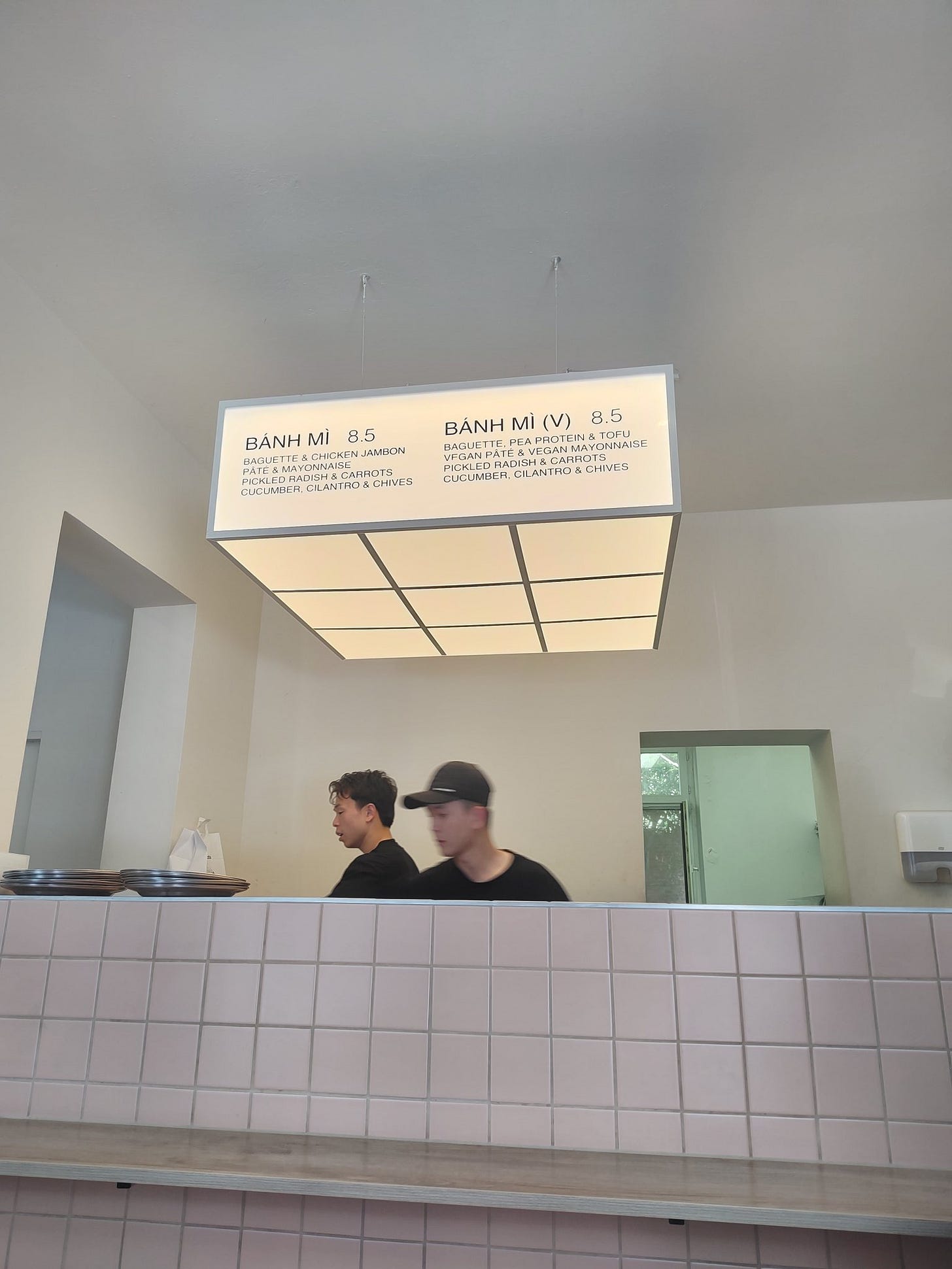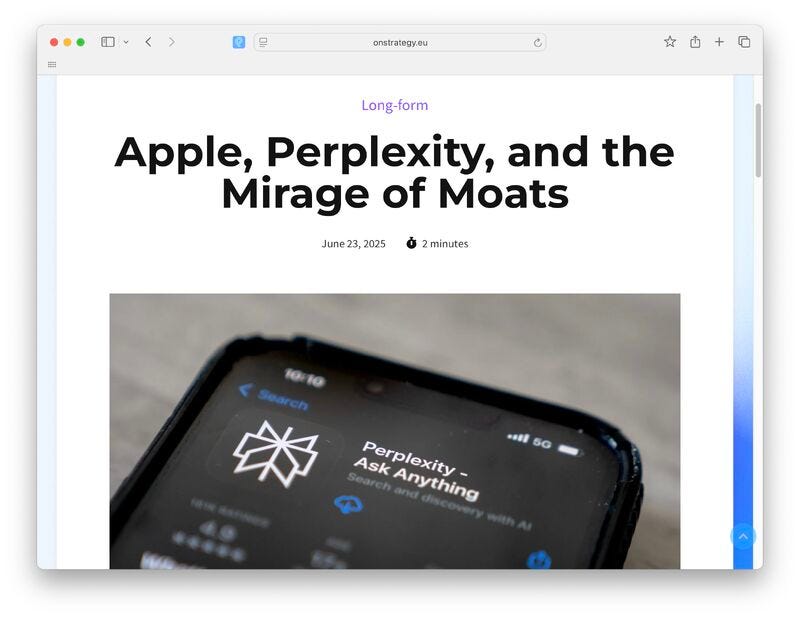(#132) 🏙️ New York City embraces socialism; 🍎 on Apple's AI strategy
AI gives you infinite PhDs and blue-collar workers
Dear #onStrategy reader,
Here is what you’ll find in this edition:
New York City embraces socialism by choosing a lunatic in Dem primaries
on META’s new glasses 👓
AI gives you infinite PhDs and blue-collar workers
Lessons from the power of a limited offer
on Apple's AI strategy
…and more 👇
Onto the update:
New York City embraces socialism by chosing a lunatic in Dem primaries
It starts, as it often does, with the feeling that we’ve seen this movie before. The world’s capital of capital wakes up one day and discovers it might soon be governed by a man whose platform includes free buses, frozen rents, and state-run grocery stores… a sort of Whole Foods meets five-year-plan. Zohran Mamdani, who just weeks ago was polling like a niche indie candidate, has now won the Democratic primary for New York City mayor, sending hedge funders into Slack threads about Miami real estate. You can practically hear the nervous clicking of Bloomberg terminals as portfolio managers Google “Cuba, but vertical.” There’s a certain comedy to watching Wall Street, which engineered the 2008 crash and then got bailed out, act shocked that voters want cheaper food and housing.
But the deeper absurdity is the déjà vu, not just from history class, but from personal history. For anyone who lived through Central or Eastern Europe’s communist chapter, this is less a surprise and more a rerun. First you kill off the entrepreneurial class. Then you put the ideologically pure (but operationally useless) in charge. Then productivity flatlines, innovation dies, and you’re left rediscovering soap production in 2045. Romania did it. Venezuela did it. San Francisco tried a mini-series. Spoiler: it ends with people leaving, fast. And the kicker? Voters who put Mamdani in charge will probably end up moving to red states and voting the same way again. Because empires, cities, civilizations…they don’t collapse from external threats. They rot from the inside, with a smile and a slogan, while the landlords Google “Lisbon tax residency.” LINK
Lessons from the power of a limited offer
🥪 A 4.7-star restaurant with only 2 things on the menu
Look, the Michelin Guide was never going to understand this. Two menu items, one countertop, and the vibe of a minimalist Scandinavian spaceship staffed by dudes who probably own a crypto wallet. But that’s the whole point. This it’s a conviction trade. You walk in, and they’re not asking what you want. They’re telling you what they make. Bánh mì or vegan bánh mì. Pick one. Or leave. The 4.7 stars? That’s just the market rewarding asymmetric clarity.
Because what we’re seeing here it's the death of “customer is always right” strategy. It’s a vertical integration of identity, aesthetics, and taste into a unit economics thesis that reads: “Doing less is doing more, as long as it’s done with surgical precision and artisanal pickled radish.” The overhead is low, the prep is tight, and the message is clear: You didn’t come here to choose. You came here because you trust us to have already chosen correctly. It’s Apple’s product strategy, but with pâté. LINK
AI gives you infinite PhDs and blue-collar workers
One day, you’re walking into a metal box in Ohio getting peppered with bruises while moving 50 kg packages in 38°C heat. The next day, a robot named Johnny 5 is doing your job at twice your speed and doesn’t need water breaks, Hoka shoes or motivational posters in the break room. It turns out the last frontier of warehouse automation wasn’t a high-tech algorithm or a robotics breakthrough. It was just finding a machine with enough suction cups to pick up the boxes that humans didn’t want to anymore. DHL ordered 1,000 of them. Johnny 5 is alive, and Megan from Virginia should probably start coding.
But let’s not pretend this is just about efficiency. It’s about optics. Because while the AI headlines are all about GPT-5 writing your emails, the real shift is physical. Watching a robot unload a truck it’s a psychological shift. This is when automation stops being a thing that happens “somewhere in the cloud” and starts being the thing that gets between you and your next paycheck. For years, the narrative has been that robots were coming for the knowledge workers. But apparently, they took a detour to the loading dock. And now, the most job-threatening invention of 2025 isn’t AGI, but a robot with a vacuum arm and a better work ethic than most interns.
Indeed, AI gives you infinite PhDs and blue-collar workers. LINK
on Apple's AI strategy
The Bloomberg reports that Apple is exploring an acquisition of Perplexity AI is unsurprising in one sense and deeply revealing in another. On the surface, Apple’s acquisition of a buzzy AI startup fits the recent pattern: Microsoft acquires (sort of) OpenAI, Google leans into DeepMind and Gemini, and Amazon throws money at Anthropic… and Apple? Apple talks up “Apple Intelligence” while running most of it in the cloud and quietly looking for ways to not miss the AI boat entirely. So yes, they’re shopping.
What is Apple buying?
The answer, at least when it comes to Perplexity, is hype and a UI layer sitting precariously atop someone else’s infrastructure. Apple dismissed LLMs as chatbots (!). But if Apple now wants to spend billions on a chatbot with a nice skin on OpenAI or Claude, then the real problem isn’t missing the AI moment, it’s misunderstanding it.
The moats Apple wants but Perplexity doesn’t have
From Ben Thomson’s interview with the CEO of Cursor, the only company showing actual defensibility at the application layer, we outlined a roadmap that looks like this:
Step 1: autocomplete with LLM sauce (think of Copilot);
Step 2: smarter completions using foundation models, customized to your local context;
Step 3: low-latency, context-aware local models (Cursor lives here);
Step 4: project-level context baked into prompts and responses;
Step 5: full automation with minimal human interaction.
Perplexity isn’t on this path. It’s building a nice product with zero distribution moat (Google), zero model moat (OpenAI), and zero infra moat (Amazon or Microsoft). Apple, by contrast, has three moats already: devices, distribution, and privacy. Buying Perplexity won’t add a fourth, but it might just be a short-term bandage for a long-term clarity problem.
Apple doesn’t need to win the AI race. But it does need to understand the course. Right now, it’s flirting with startups that look good on the track but are running on someone else’s legs. LINK
on coffee ☕️

Sure, so now even your morning existential crisis needs a paper filter. Apparently, your French press is trying to kill you: slowly, politely, with a side of artisanal foam. Dr. Rhonda Patrick says those cozy, unfiltered brews are sneakily smuggling diterpenes into your bloodstream, and if you drink enough of them, you might just trade your LDL for a VIP seat in the dementia express lane. So, it’s not just that the French press is a pain to clean, it’s also a molecular accomplice in a long game of vascular sabotage. Your pour-over hipster cred might come with a pancreatic penalty.
Meanwhile, the water-soluble good guys (hello, polyphenols) are sitting in your mug wondering why you keep drinking the cholesterol cocktail instead of the antioxidant elixir. Coffee is now a proxy war between your taste in brewing methods and your long-term cognitive function. Modern life is amazing. You can get your genome sequenced for $99, and then ignore all of it just to double down on French press. LINK
on META’s new glasses 👓
Meta’s new $399 Oakley AI glasses with 3K video recording are basically what happens when Zuckerberg dreams of turning you into a wearable GoPro, except instead of surfing a wave, you’re walking to Carrefour and capturing algorithmically-optimized footage of a crosswalk. Maybe this is the next frontier of creator culture, hands-free POV of your morning latte, but it’s also giving “tech bro surveillance cosplay.” You don’t feel like a cyborg when wearing them, just a guy with sunglasses who might accidentally livestream a stranger’s dog walk to Twitter. Sure, they might eventually replace action cams or help influencers shoot hands-free yoga tutorials, but right now they mostly scream: “I paid $399 to take them at Coachella.” LINK
PRINCIPLE: You don’t need a secretary
“You don’t need a secretary,” said Nassim Nicholas Taleb. And he was right.
You don’t need someone to manage your chaos. You need to eliminate the chaos.
In the old world (before 2020), a secretary was a status symbol. Proof that your life was too big, too busy, too important to manage alone.
In the new world, you don’t need a gatekeeper; just a filter would make it and for this, you need clarity.
You need fewer meetings, better filters, and the courage to say “no.”
Taleb was against the illusion of importance. The belief that being too busy means you’re doing something right.
But busyness is often a form of laziness. A refusal to prioritize. A way to avoid hard decisions by drowning in easy distractions.
The truly effective don’t outsource their thinking. They simplify their systems.
If your day is a blur of calls, emails, and calendars managed by someone else, ask yourself: Is this necessary, or is it just normal?
Technology gives you leverage. Clarity gives you power. But both are worthless without ownership of your own time.
So, you don’t need a secretary. You need to take yourself off autopilot. LINK
Six months ago, I launched my book on strategy:
Through 28 chapters, I covered three parts: (1) Strategy, (2) Innovation & Growth, and (3) Generative AI.
See a full sample - the chapter on Network Effects. - click HERE











Is that first bit about NYC satire? I can’t tell.